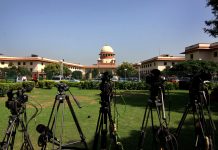 It was not so long ago that Bollywood Superstar Aamir Khan exposed malpractices in medical profession through his popular TV show “Satyamev Jayate” leading to an uproar by the Indian Medical Association, seeking an apology from him and later saying that he was ready to face any legal action. “If the medical profession had been insulted and defamed by anybody, it is probably by those who are indulging in unethical practices and not by the show which was not against doctors or medical professions,” Aamir had said.
It was not so long ago that Bollywood Superstar Aamir Khan exposed malpractices in medical profession through his popular TV show “Satyamev Jayate” leading to an uproar by the Indian Medical Association, seeking an apology from him and later saying that he was ready to face any legal action. “If the medical profession had been insulted and defamed by anybody, it is probably by those who are indulging in unethical practices and not by the show which was not against doctors or medical professions,” Aamir had said.
Today we at TEHELKA are faced with a similar piquant situation. The recent arrest of 10 persons and questioning of nephrologists of Indraprashtha Apollo Hospitals by Delhi Police points to the involvement of reputed private health institution’s complicity in unethical kidney rackets in the country.
The Apollo Hospital kidney racket reminds us of Gurgaon kidney racket of 2008, whose mastermind Amit Kumar was arrested from Nepal. Kidneys from poor people from western Uttar Pradesh were transplanted on to affluent patients from the United States, United Kingdom, etc. for large sums of money. In the early 2000s, there was the Amritsar kidney racket said to be worth 200 crore wherein poor people were being exploited. They were given a pittance for kidneys which were transplanted to rich people through fake documentats. In the year 2015, Hyderabad Police cracked a kidney racket by arresting a doctor for selling a “kidney package” for 30 lakh and above, arranging donors, taking patients abroad for surgery etc. In Jalandhar, a kidney racket was busted only last year.
According to data complied by the Indian Transplant Registry, of the 21,395 kidney transplants that have been performed in the country since 1971, a meagre 783 came from cadaver donors. The annual requirement is over two lakh kidneys in the country clearly showing a mismatch between demand and supply exposing poor unassuming victims to exploitation by the scamsters. Kidneys managed for pittance by the poor are then transplanted into patients for large sums.
The process
Organs and tissue transplants are governed by the Transplantation of Human Organs and Tissues Act, 2011. As per the Act, the organs can either be retrieved from cadavers or from brain dead patients with the family consent or may be donated by living donors. The donors that are recognised by law are near relatives like spouses, parents, siblings, grandparents, grandchildren; others who can donate out of affection and attachment or for a special reason but not for financial considerations.
A comprehensive set of documentation is required including affidavits with photographs of both the donor and the recipient certified by a first class magistrate. There are in-camera interviews too. Two separate committees for related and unrelated donors evaluate and clear cases. The committee that looks at procedures involving related donors comprises hospital staff, but people who are not part of the treating team. For unrelated donors, there are two nominees of the government who evaluate the cases. In the Apollo kidney racket, the police are still investigating. Preliminary investigations suggest that assistants of the transplant surgeon in the hospital drew up fake documents and got donors for patients who were willing to pay hefty sums for the organs. In such a scenario, the doctors naturally find an escape route and say that “We are doctors, not an investigating agency. We have to go by the documents that have been placed before us. We do not have the wherewithal and paraphernalia to check their veracity”.
In this case, the names of the three doctors of Apollo Hospitals had emerged during the interrogation of the racket’s kingpin Rajkumar Rao, who was allegedly operating in different states and had established links with similar cartels in other countries. Ten persons, including two personal assistants of a nephrologist, several middlemen, and donors including two women, besides the kingpin have been arrested in connection with the racket so far.
When Deputy Commissioner of Police Mandeep Singh Randhawa confirmed “We have detained a staff member of a doctor of the Apollo hospital and are questioning him”, he had removed the lid off the ongoing malpractice in the premier private health institution in Delhi. Police busted the kidney racket on June 2 with the arrest of two hospital employees and three suspected touts.
The arrest of the alleged mastermind T Rajkumar from Kolkata along with three donors including two women from Uttar Pradesh’s Kanpur and a man from West Bengal’s Siliguri showed that the roots of the malady had spread to other parts of the country. Brajesh Chauhan (40) was found to be involved in clearing five kidney transplant cases, which were brought to him by the kingpin, T Raj Kumar Rao. Police have sought information about transplants at four more hospitals, including two well-known ones in the city. It was also found that Rao was in touch with a former associate in Jalandhar through his Facebook profile under the pseudonym, Raj Sangam, and had also accepted advance payments for two transplants. Police suspect that few of the patients may have been medical tourists from Afghanistan and Africa. The kingpin is suspected of having run similar rackets in Nepal, Sri Lanka and Indonesia.
Apollo Hospital admitted to have unwittingly removed organs from victims and assured to help the police in the investigation of the racket. Apollo Hospitals in a statement said that “While all due precautions were conducted, fake and forged documents were used for this racket with a criminal intent”.
Genesis of kidney racket
Organ donation, specifically kidney donation that has often snowballed into a major racket, fuels the black markets is the result of a chronic shortage of organs available for transplant. The 2011 Transplantation of Human Organs and Tissues Act says that organs can either be retrieved from cadavers or from brain-dead patients with the family’s consent or may be donated by living donors. The process of organ donation involves procurement of an extensive set of documents including an affidavit. A committee then screens the documents.
In December 2015, Minister of Health and Family Welfare JP Nadda had highlighted the problem in Parliament. “There is a huge gap between the demand and supply of human organs for transplantation. The government accords a very high priority for increasing donation of cadaver organs to bridge the gap between demand and supply and save the lives of a large number of persons suffering from end-stage organ failure”. Nadda has indeed hit the nail on the head! However, he needs to act fast as the Apollo kidney racket points to how poor are being exploited and kidney racket flourishes in the National capital itself.
letters@tehelka.com












